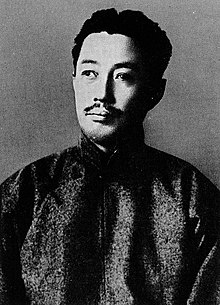Ikki day care center
Kita Ikki ( Japanese 北 一 輝 ; April 3, 1883 , † August 19, 1937 ) was a Japanese author , intellectual and political philosopher of the Shōwa period .
biography
He was born on the island of Sado in Niigata prefecture under his real name Kita Terujiro . During his student days at Waseda University in Tōkyō , he was drawn to socialism and met many influential figures in the socialist movement of early Japan. This movement, the Shakai seisaku gakkai , was less oriented towards Marxist theory and practice, but rather strived for a strong state with social security based on the model of the German Empire and the ideas of Otto von Bismarck and Gustav v. Schmoller. He traveled to China to help overthrow the Qing Dynasty .
However, when he returned in 1919, he was very disappointed by the Chinese Revolution and socialism. Together with Ōkawa Shūmei and others he formed the Yūzonsha , a nationalist organization, and devoted his time to writing and political activities. Gradually he became the leading theorist and philosopher of the radical right movement in Japan prior to World War II .
Kitta Ikki first described his philosophy of state socialism in his book The Theory of Japan's National Polity and Pure Socialism ( 国体 論及 び 純正 社会主義 , kokutairon oyobi junsei shakaishugi ), published in 1906, which still retains his pro- Marxist stance on it Describes time. His revised pro [fascist] stance appears in his subsequent book An Outline Plan for the Reorganization of Japan ( 日本 改造 法案 大綱 , nihon kaizō hōan taikō ), which appeared in 1923. Both books propagated a national policy of Japan ( kokutai ) through which Japan should lead a unified and liberated Asia ( Pan-Asian movement ). His plan was to carry out a coup d'état to replace the government with a radically reorganized, corruption-free parliament. The new "nationally reorganized parliament" should nationalize important industries, set boundaries for individual wealth and possessions and so strengthen Japan so that it would be able to free Asia from Western imperialism .
Kita was a contradicting person. On the one hand, he propagated a policy aimed at the liberation of Asia; on the other hand, he was in favor of the expansion of Japan and the associated territorial gain, which he considered urgently needed due to the strong population growth.
Kita's writings had a strong influence on the Japanese military, particularly the Imperial Japanese Army , which participated in the unsuccessful February coup of 1936 . Following the events on February 26, Kita was arrested by the Kempeitai, sentenced by a military tribunal and executed .
literature
- Laurinat, Marion: Kita Ikki (1883-1937) and the February coup of 1936. A historical examination of Japanese sources of military justice . Münster: Lit, 2006.
- Tankha, Brij: Kita Ikki and the Making of Modern Japan. A Vision of Empire . Folkestone: Global Oriental, 2006.
See also
| personal data | |
|---|---|
| SURNAME | Ikki day care center |
| ALTERNATIVE NAMES | 北 一 輝 (Japanese) |
| BRIEF DESCRIPTION | Japanese author, intellectual and political philosopher |
| DATE OF BIRTH | April 3, 1883 |
| PLACE OF BIRTH | Sado Island , Niigata Prefecture |
| DATE OF DEATH | August 19, 1937 |
